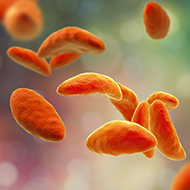Toxoplasma gondii study receives funding boost

The project will develop a more relevant host-specific system for determining the severity of T.gondii infection.
More than half a million pounds has been awarded to scientists at the Moredun Research Institute to tackle one of the world’s most common parasites.
The grant aims to improve understanding of foodborne transmission and the infectious nature of Toxoplasma gondii (T. gondii) and help in the development of future vaccines and drugs.
Moredun will work in collaboration with the University of São Paulo in Brazil, Newcastle University and Biomathematics and Statistics Scotland to develop a more relevant, host-specific system for determining the severity of T. gondii infection and predicting how the disease will progress.
Project lead Dr Clare Hamilton from Moredun said: “This exciting, collaborative project will not only improve our understanding of Toxoplasma virulence in different hosts which could help aid future vaccine development and control strategies, it also has the potential to develop new culture-based systems to assess infectivity and virulence of different parasite strains. I am delighted to be working with all of our partners and look forward to seeing the results of the next three years.”
T. gondii can infect all warm-blooded animals, including humans, and is prevalent the world over. It is especially dangerous for pregnant women and people who are immune-compromised. For sheep, T.gondii is a major cause of abortion.
Animals and people can pick up the infection either through the ingestion of undercooked meat, ingestion of parasite eggs (oocysts) from cat faeces, or from mother to foetus during pregnancy. Toxoplasmosis is recognised as one of the most important foodborne diseases in the world.
In the study, researchers will develop the host system using cells and 3D “mini-guts” (fully functioning, lab-grown gut tissue) from different host species. The team will also assess the prevalence of T. gondii by studying retail meat samples in São Paulo, using the 'mini guts' to help determine the risk to public health.
Dr Hilda Fátima de Jesus Pena, University of São Paulo, Brazil, said: “Brazil is considered a hotspot for T. gondii genetic diversity. This diversity is linked with a high occurrence of ocular toxoplasmosis in some regions of the country and severe cases of congenital toxoplasmosis.
She continued: “In general, seroprevalence to the parasite is high all over the country both in human and animal populations. This project will be a great opportunity to investigate T. gondii strains and their viability in different types of meat consumed by the population of São Paulo, the largest city of South America in terms of its population and economy."
The grant was awarded from the Biotechnology & Biological Sciences Research Council and the Fundação de Amparo à Pesquisa do Estado de São Paulo.



 The RCVS has announced a new version of its 1CPD mobile app, with enhanced features for veterinary surgeons and veterinary nurses to record their continuing professional development.
The RCVS has announced a new version of its 1CPD mobile app, with enhanced features for veterinary surgeons and veterinary nurses to record their continuing professional development.